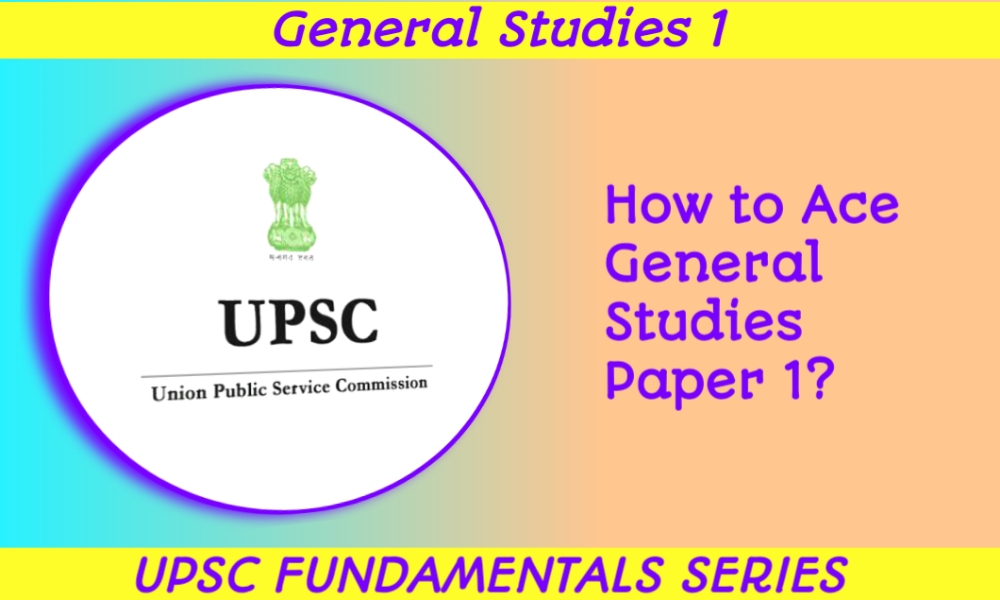How to ace General Studies Paper 1?
General Studies Paper 1 is a crucial component of the UPSC CSE Main Exam. It tests a wide range of subjects, including Indian Heritage and Culture, the History of India and Indian National Movement, Geography of India and the World, and Society
HOT TOPICSFUNDAMENTAL
12/29/20244 min read


How to ace GS 1?
General Studies Paper 1 is a crucial component of the UPSC CSE Main Exam. It tests a wide range of subjects, including Indian Heritage and Culture, the History of India and Indian National Movement, Geography of India and the World, and Society. This paper demands a comprehensive understanding of Indian history, culture, geography, and social issues.3
Understanding the Syllabus
Before embarking on your preparation, a thorough understanding of the syllabus is paramount. Here's a breakdown of the key areas covered in General Studies Paper 1:
Indian Heritage and Culture:
History, Philosophy, and Art Forms
Literature
Music
Dance
Architecture4
Paintings5
Sculpture6
Folk Art and Crafts
Indian Thought – Contributions of Thinkers and Philosophers from India and the World
Religion and Philosophy
History of India and Indian National Movement:
Modern India
Social, Economic, and Political History
Indian National Movement
Contributions of prominent leaders
Geography of India and the World:
Physical, Social, Economic, and Political Geography of India and the World
Distribution of resources, population, industries, agriculture
Important Geophysical phenomena such as earthquakes, volcanoes, cyclones, etc.
Geographical features and their location-changes in critical geographical features (including water bodies and ice-caps) and in flora and fauna and the effects of such changes
Society:
Salient features of Indian Society, Diversity of India
Role of Women and Women’s Organizations
Population and associated issues
Poverty and developmental issues
Urbanization
Social empowerment, communalism, regionalism & secularism
Social reforms and movements
Effects of globalization on Indian society
Social issues in India
Comprehensive Preparation Strategy
1. Building a Strong Foundation:
History:
Modern India: Study from Bipin Chandra's book, Spectrum's Modern India, and NCERT textbooks.
Indian National Movement: Refer to Bipan Chandra's book, Spectrum's Modern India, and NCERT textbooks.
Geography:
Physical Geography: Refer to NCERT textbooks from Class 6 to 12, Goh Cheng Leong's Certificate Physical and Human Geography, and Savindra Singh's Geography of India.
Indian Geography: Refer to NCERT textbooks, Majid Husain's Geography of India, and Savindra Singh's Geography of India.
World Geography: Refer to NCERT textbooks, Goh Cheng Leong's Certificate Physical and Human Geography, and Atlas.
Culture:
Refer to Nitin Singhania's book on Indian Art and Culture, NCERT textbooks on Art and Culture, and CCRT (Centre for Cultural Resources and Training) publications.
Society:
Refer to NCERT textbooks on Sociology, Ramesh Singh's Indian Economy, and current affairs sources.
2. Mastering Current Affairs:
Regular Reading: Read newspapers like The Hindu, Indian Express, and The Times of India daily.
Magazines: Regularly read magazines like Yojana, Kurukshetra, and Frontline.
Online Resources: Utilize online resources like PIB, PRS Legislative Research, and government websites for updated information.
Note-Making: Maintain a daily or weekly diary to summarize important news and events.
3. Developing Analytical Skills:
Answer Writing Practice: Practice writing answers regularly. Focus on clarity, structure, and presentation. Get your answers evaluated by mentors or seniors.
Essay Writing: Develop strong essay writing skills by practicing regularly. Analyze previous year essays and identify key themes and arguments.
Case Studies: Analyze case studies related to social, economic, and environmental issues.
4. Enhancing Conceptual Clarity:
Focus on Understanding: Emphasize conceptual understanding rather than rote learning.
Connect Concepts: Connect different concepts within the syllabus and with current affairs.
Mind Mapping: Create mind maps and flowcharts to visualize complex concepts and relationships.
5. Utilizing Resources Effectively:
NCERT Textbooks: NCERT textbooks provide a solid foundation for all subjects.
Standard Textbooks: Refer to standard textbooks for in-depth understanding of specific topics.
Coaching Institutes (Optional): Consider joining a reputable coaching institute for guidance, structured learning, and peer interaction.
Online Resources: Utilize online resources like websites, blogs, and YouTube channels for supplementary learning and current affairs updates.
Test Series: Enroll in test series to assess your progress, identify areas of improvement, and get accustomed to the exam environment.
6. Maintaining Motivation and Perseverance:
Set Realistic Goals: Set achievable short-term and long-term goals to track progress and stay motivated.
Reward Yourself: Celebrate small victories and reward yourself for achieving milestones.
Find a Support System: Connect with fellow aspirants, mentors, and family for support, encouragement, and guidance.
Practice Mindfulness: Engage in mindfulness techniques like meditation and deep breathing exercises to manage stress and improve focus.
7. Taking Care of Yourself:
Physical Health: Maintain a healthy lifestyle by eating nutritious food, exercising regularly, and getting sufficient sleep.
Mental Health: Practice stress management techniques like meditation, yoga, and deep breathing exercises.
Social Life: Maintain a healthy social life and spend time with loved ones to avoid burnout.
8. Continuous Learning and Adaptation:
Stay Updated: Stay updated with current affairs and policy changes through newspapers, magazines, and online resources.
Adapt to Changes: Be flexible and adaptable to changes in the exam pattern or syllabus.
Learn from Others: Learn from the experiences of successful candidates and incorporate their strategies into your own preparation.
Subject-Wise Approach:
Indian Heritage and Culture:
Focus on understanding the historical and cultural significance of different art forms, philosophies, and religions.
Connect historical events with cultural developments.
Explore the contributions of prominent thinkers and philosophers.
History of India and Indian National Movement:
Understand the chronological order of events and their significance.
Analyze social, economic, and political developments throughout Indian history.
Study the contributions of prominent leaders and their ideologies.
Geography of India and the World:
Develop a strong understanding of physical and human geography concepts.
Learn to analyze maps and interpret geographical data.
Stay updated on current geographical issues like climate change, environmental degradation, and natural disasters.
Society:
Understand the diverse social fabric of India and the challenges faced by Indian society.
Analyze social issues like poverty, inequality, and social exclusion.
Explore the role of women, NGOs, and government initiatives in addressing social challenges.
Key Takeaways:
Comprehensive Understanding: Develop a comprehensive understanding of all topics covered in the syllabus.
Current Affairs: Stay updated with current affairs and connect them with the syllabus.
Analytical Skills: Develop strong analytical and critical thinking skills.
Answer Writing Practice: Practice writing answers regularly and get them evaluated.
Motivation and Perseverance: Maintain motivation and perseverance throughout the journey.
Self-Care: Prioritize your physical and mental health.
Continuous Learning: Continuously learn, adapt, and improve your preparation strategy.
By following these guidelines and maintaining a dedicated approach, you can significantly increase your chances of acing General Studies Paper 1 of the UPSC CSE Main Exam. Remember that success is not a destination but a journey. Embrace the challenges, learn from your mistakes, and never give up on your dreams.
